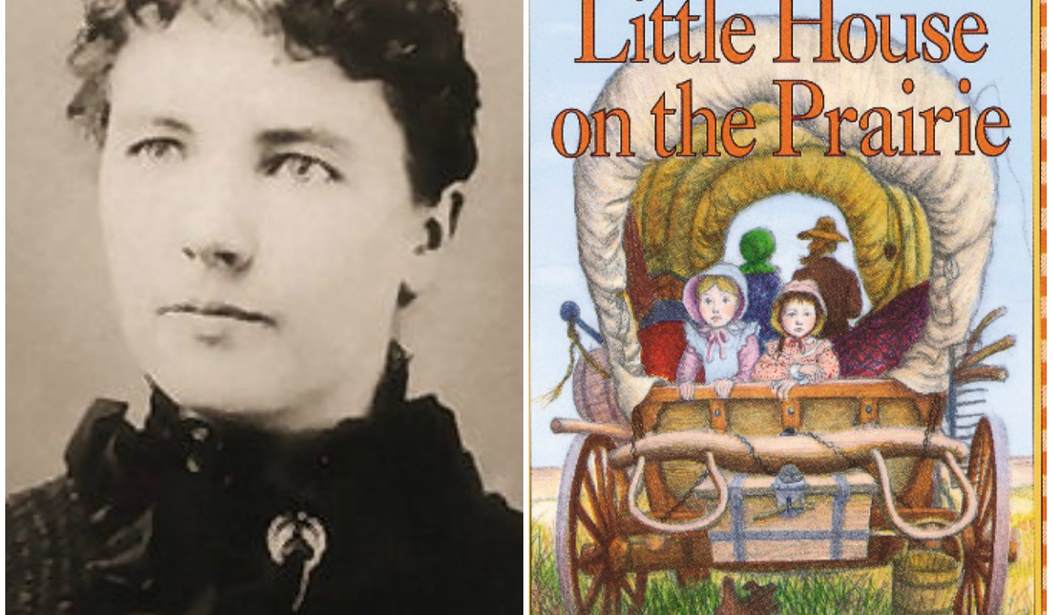The works of Laura Ingalls Wilder have enthralled generations of kids. I was one of them. My mom passed on her love of the Little House books to my siblings and me — with some help from the classic television series, and now my nieces love the books too.
Wilder filled her account of frontier life in the American Midwest — based on her family’s own experiences — with vivid scenarios and evocative characters, which is the main reason for the decades of appeal that her novels have had on young readers. Those books are full of details, some of which reflect a much different era in regard to women and minorities. But Wilder’s works aren’t meant as a manual for interpersonal relations; rather, they’re a reflection of a portion of our nation’s history, warts and all.
Unfortunately for the modern left, Wilder’s books aren’t sufficiently politically correct. So, like many other public figures before her, she is a pariah for reflecting the views of a particular time frame, rather than ignoring or sanitizing them. As a result, the American Library Association is removing the name of Laura Ingalls Wilder from an award that their children’s division, the Association for Library Service to Children (ALSC), gives out because of the books’ depictions of Native Americans and African Americans.
The organization’s website flatly declares the name change in its announcement of this year’s winner:
At its meeting on Saturday, June 23, 2018, the Association for Library Service to Children Board voted to change the name of the Laura Ingalls Wilder Award to the Children’s Literature Legacy Award.
This decision was made in consideration of the fact that Wilder’s legacy, as represented by her body of work, includes expressions of stereotypical attitudes inconsistent with ALSC’s core values of inclusiveness, integrity and respect, and responsiveness.
The first complaints about Wilder’s depiction of American Indians date back to 1952, when the ALSC was considering naming an award in her honor. A reader had complained about references to Indians in Little House on the Prairie that characterized natives as animal-like savages. The Washington Post explains:
The reader pointed specifically to the book’s opening chapter, “Going West.” The 1935 tale of a pioneering family seeking unvarnished, unoccupied land opens with a character named Pa, modeled after Wilder’s own father, who tells of his desire to go “where the wild animals lived without being afraid.” Where “the land was level, and there were no trees.”
And where “there were no people. Only Indians lived there.”
Harper’s, the publisher of Wilder’s books, changed “people” in that last passage to “settlers,” and that must have been enough to convince the ALSC to not only name the award for Wilder but to make her the first recipient.
But the complaints trickled in over the years, and in February of this year the ALSC began to explore the possibility of stripping Wilder’s name from the award:
It continues to be a focus of scholarship and literary analysis, which often brings to light anti-Native and anti-Black sentiments in her work. The ALSC Board recognizes that legacy may no longer be consistent with the intention of the award named for her. The Board voted unanimously Saturday to establish a task force to explore the ALSC awards program within the context of our core values and our strategic plan, beginning with the Wilder Award.
And now the deed has been done. But what did the ALSC accomplish?
Does removing Wilder’s name from the award undo the hurts of centuries of racism? Are today’s victims of discrimination magically seeing their pain go away and their injustices vanish? I doubt that stripping one name from an award will undo the despicable deeds of years past — especially when Laura Ingalls Wilder didn’t commit those acts.
What the ALSC’s actions do is wash away a unique honor for a woman whose writing displayed a gentle feminism. Yes, Wilder was a feminist in the best sense of the word — as Lucy Ellmann put it at The Guardian, Wilder’s works were “about appreciating femaleness for femaleness’s sake.” Her legacy carried on in her daughter Rose Wilder Lane, herself a writer and editor and one of the earliest leading lights of libertarianism.
But none of that matters to the ALSC. Nor does the enjoyment of generations of young people from the incredible works Wilder produced, even though they may have included less than savory descriptions of certain people. Wilder’s sin was that she failed to display political correctness decades before political correctness was even a movement.
Erasing the descriptions of history does not mean that the events never took place. And denying an honor to such a superb chronicler of history as Wilder does more of a disservice to her fans and the practitioners of her legacy than it does a service to the people hurt by her characters’ words. Shame on the ALSC for such a ridiculous move.










Join the conversation as a VIP Member